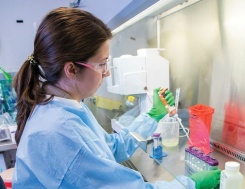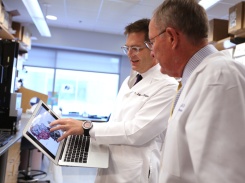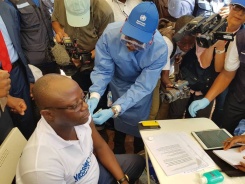Towards a universal flu vaccine
September 30, 2019
Flu shots can be hard to sell to the public. Even a run-of-the-mill influenza infection can be debilitating to otherwise healthy people, and lethal to those who are elderly or frail, so vaccinations are important. The problem is that flu vaccines deliver inconsistent performance. “In a good season, we’re up to 60% effectiveness, but in bad, mismatched years it can be as low as 10% or 20%,” says Barney Graham, deputy director of the Vaccine Research Center at the US National Institute of Allergy and Infectious Diseases (NIAID) in Bethesda, Maryland.
Partnership to help bring Zika virus therapy to clinic
September 30, 2019
Researchers at Vanderbilt University Medical Center are partnering with the Dutch biopharmaceutical firm Batavia Biosciences and Nashville-based IDBiologics to bring to the clinic a highly potent Zika virus neutralizing antibody they isolated three years ago. The mosquito-borne Zika virus is believed to cause microcephaly, unusually small heads, and other congenital malformations in children born to infected women. Currently there is no way to prevent Zika virus infection or its aftermath.
VUMC partners with Batavia to move promising Zika antibody therapy closer to the clinic
September 9, 2019
https://www.news-medical.net/news/20190906/VUMC-partners-with-Batavia-to-move-promising-Zika-antibody-therapy-closer-to-the-clinic.aspx
Researchers at Vanderbilt University Medical Center (VUMC) are partnering with the Dutch biopharmaceutical firm Batavia Biosciences and Nashville-based IDBiologics to bring to the clinic a highly potent Zika virus neutralizing antibody they isolated three years ago.
The mosquito-borne Zika virus is believed to cause microcephaly, unusually small heads, and other congenital malformations in children born to infected women. Currently there is no way to prevent Zika virus infection or its aftermath.
First RNA-Delivered Antibody Set to Enter Clinical Trials
February 21, 2019
A monoclonal antibody against the chikungunya virus developed by researchers at Vanderbilt University Medical Center is the first monoclonal antibody encoded by messenger RNA to enter a clinical trial.
Moderna Inc., a biotechnology firm based in Cambridge, Massachusetts, that is focused on developing mRNA-based vaccines and therapeutics, announced the clinical trial earlier this month.
Researchers comprehensively sequence the human immune system
February 14, 2019
For the first time ever, researchers are comprehensively sequencing the human immune system, which is billions of times larger than the human genome. In a new study published in Nature from the Human Vaccines Project, scientists have sequenced a key part of this vast and mysterious system -- the genes encoding the circulating B cell receptor repertoire.
Researchers push forward frontiers of vaccine science
February 13, 2019
Using sophisticated gene sequencing and computing techniques, researchers at Vanderbilt University Medical Center and the San Diego Supercomputer Center have achieved a first-of-its-kind glimpse into how the body’s immune system gears up to fight off infection.
Their findings, published Feb. 13 in the journal Nature, could aid development of “rational vaccine design,” as well as improve detection, treatment and prevention of autoimmune diseases, infectious diseases, and cancer
DARPA and VUMC use high-throughput synthetic genes to hasten antibody discovery
January 30, 2019
Recent outbreaks of deadly viruses like Ebola, Zika and Monkeypox have shocked the world with their impact. In nature, the viruses typically lie dormant in their animal hosts, accruing mutations that change their genetic make-up significantly. Once an event occurs that allows the viruses to jump to humans, our immune systems are not prepared. The viruses spread rapidly, causing significant, life threatening infection, reminding us just how vulnerable we are to these diseases.






